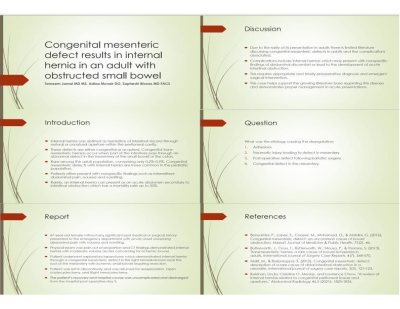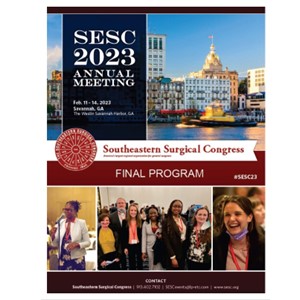General Surgery
Category: Quickshot Oral Session 25
Quickshot Oral : Quickshot Oral Session 25
CONGENITAL MESENTERIC DEFECT CAUSING INTERNAL HERNIATION IN A HEALTHY ADULT RESULTING IN STRANGULATED SMALL BOWEL
Tuesday, February 14, 2023
7:00am - 8:00am East Coast USA Time

- TJ
Tameem Jamal, MD MS
Resident
HCA Grandstrand, United States - SB
Saptarshi Biswas, MD FACS
Attending, United States
Presenter(s)
Principal Contact(s)
Objectives:
Introduction: Internal hernia is defined as herniation of intestinal viscera through natural or unnatural aperture within the peritoneal cavity. These defects are either congenital or acquired. Congenital trans-mesenteric hernias occur when part of the intestines pass through an abnormal defect in the mesentery of the small bowel or the colon, normally these are not associated with a hernia sac and can have a considerable length of bowel can protrude through the defect. Congenital mesenteric defects can lead to a small bowel obstruction. Rare among the adult population, comprising only 0.2%–0.9%. Congenital mesenteric defects with internal hernia are more common in the pediatric population. Patients often present with nonspecific findings such as intermittent abdominal pain, nausea and vomiting. Rarely, an internal hernia can present as an acute abdomen secondary to intestinal obstruction which has a mortality rate up to 50%. We present a rare case of a patient presenting with acute abdomen caused by small bowel strangulation due to a congential transmesenteric defect.
Case Report: 67-year-old female without any significant past medical or surgical history presented to the emergency department with acute onset worsening abdominal pain with nausea and vomiting. Physical exam was pain out of proportion and CT findings demonstrated internal hernia with moderate volume ascites concerning for ischemic bowel. Patient underwent exploratory laparotomy which demonstrated internal hernia through a congenital mesenteric defect in the right hemiabdomen near the root of the mesentery with ischemic small bowel requiring resection. Patient was left in discontinuity and was returned for reexploration, Open cholecystectomy, and Right hemicolectomy. The patient’s recovery and hospital course was uncomplicated and discharged from the hospital post-operative day 5.
Discussion: Due to the rarity of its presentation in adults there is limited literature discussing congenital mesenteric defects in adults and the complications associated. Complications include internal hernias which may present with nonspecific findings of abdominal discomfort or lead to the development of acute intestinal obstruction. This requires appropriate and timely preoperative diagnosis and emergent surgical intervention.
Conclusion: Due to the rarity of this disease there is limited literature discussing the pathology and management of congenital internal hernias complicated by obstruction. This case helps support the growing literature base regarding this disease and demonstrates proper management in acute presentations.
Methods:
Results:
Conclusion:
Introduction: Internal hernia is defined as herniation of intestinal viscera through natural or unnatural aperture within the peritoneal cavity. These defects are either congenital or acquired. Congenital trans-mesenteric hernias occur when part of the intestines pass through an abnormal defect in the mesentery of the small bowel or the colon, normally these are not associated with a hernia sac and can have a considerable length of bowel can protrude through the defect. Congenital mesenteric defects can lead to a small bowel obstruction. Rare among the adult population, comprising only 0.2%–0.9%. Congenital mesenteric defects with internal hernia are more common in the pediatric population. Patients often present with nonspecific findings such as intermittent abdominal pain, nausea and vomiting. Rarely, an internal hernia can present as an acute abdomen secondary to intestinal obstruction which has a mortality rate up to 50%. We present a rare case of a patient presenting with acute abdomen caused by small bowel strangulation due to a congential transmesenteric defect.
Case Report: 67-year-old female without any significant past medical or surgical history presented to the emergency department with acute onset worsening abdominal pain with nausea and vomiting. Physical exam was pain out of proportion and CT findings demonstrated internal hernia with moderate volume ascites concerning for ischemic bowel. Patient underwent exploratory laparotomy which demonstrated internal hernia through a congenital mesenteric defect in the right hemiabdomen near the root of the mesentery with ischemic small bowel requiring resection. Patient was left in discontinuity and was returned for reexploration, Open cholecystectomy, and Right hemicolectomy. The patient’s recovery and hospital course was uncomplicated and discharged from the hospital post-operative day 5.
Discussion: Due to the rarity of its presentation in adults there is limited literature discussing congenital mesenteric defects in adults and the complications associated. Complications include internal hernias which may present with nonspecific findings of abdominal discomfort or lead to the development of acute intestinal obstruction. This requires appropriate and timely preoperative diagnosis and emergent surgical intervention.
Conclusion: Due to the rarity of this disease there is limited literature discussing the pathology and management of congenital internal hernias complicated by obstruction. This case helps support the growing literature base regarding this disease and demonstrates proper management in acute presentations.
Methods:
Results:
Conclusion:

